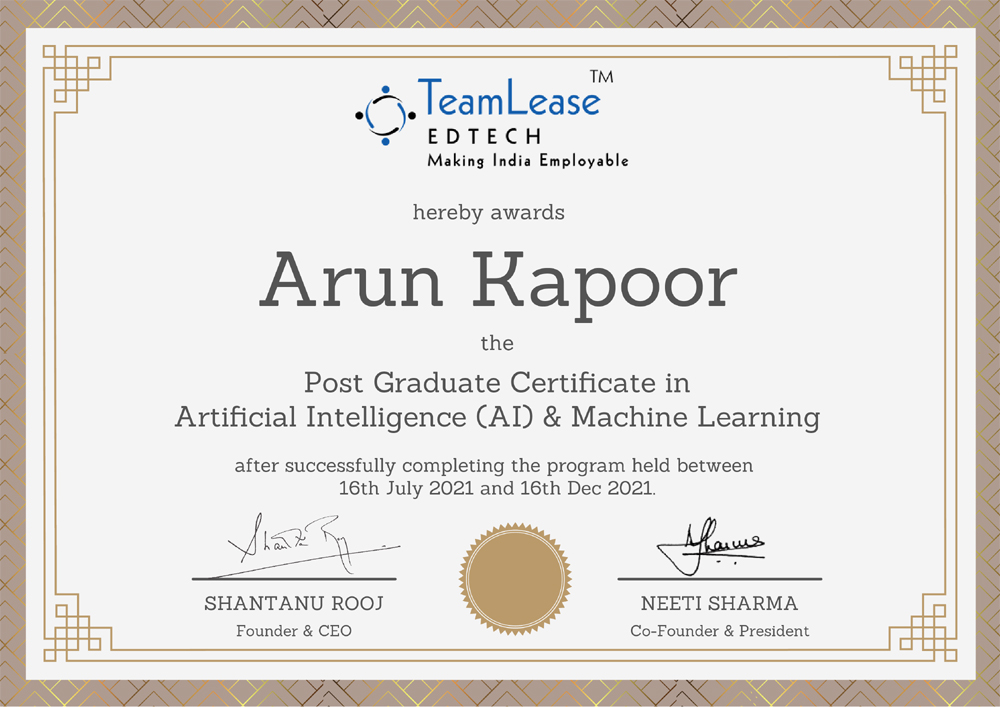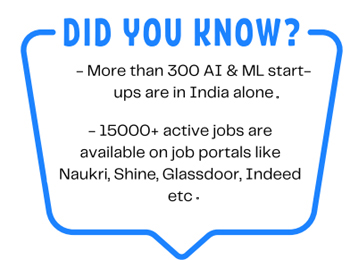Artificial Intelligence (AI) is an area of computer science that emphasizes the creation of intelligent machines that work and react like humans. Computers with artificial intelligence are designed to include activities like speech recognition, image recognition, and pattern recognition.
More than 50% of businesses are planning to implement AI & ML for various purposes to improve their business efficiencies. Globally, AI & ML are undoubtedly the most sought skillsets since last few years as per the LinkedIn Skill Report.
This cutting-edge program is for candidates aspiring to enhance their skillsets in Artificial Intelligence and Machine Learning to reach the top of the competition in the market.
 Who Should Attend?
Who Should Attend?
- Students in the final year of engineering (Any branch)
- BCA, MCA, BSc-IT, MSc-IT Grads
- IT Professionals, IT Consultants, IT Freshers
 Course Duration
Course Duration
220 Hours (6 months)
 Course Fee
Course Fee
60,000 + GST
Loan facility available
 Eligibility
Eligibility
Graduation with at least 50% marks
 Pedagogy
Pedagogy
Virtual instructor-led training (VILT)
 Certified / Accredited By
Certified / Accredited By
TeamLease EdTech
 Placement Assistance
Placement Assistance
Placement assistance available
 Become an AI practitioner by gaining ability to perform tasks on various industry applications of AI
Become an AI practitioner by gaining ability to perform tasks on various industry applications of AI
 Apply Tensorflow, Scikit Learn library, Keras and other machine learning and deep learning tools & algorithms
Apply Tensorflow, Scikit Learn library, Keras and other machine learning and deep learning tools & algorithms
 Develop an ability to work on algorithms in real world problems using Image and Speech Recognition
Develop an ability to work on algorithms in real world problems using Image and Speech Recognition
 Develop Chatbots and work on complex data forms
Develop Chatbots and work on complex data forms
 NLP, Deep Learning, & Graphical Models along with a solid foundation in Predictive Analytics on real world problems
NLP, Deep Learning, & Graphical Models along with a solid foundation in Predictive Analytics on real world problems
- Introduction to AI
- Computer Organization & Digital Architecture
- Programming with C
- Operating Systems
- Advanced Database Management System
- Python for Data Science
- Machine Learning
- Text Analytics
- Programming with TensorFlow
- Neural Networks
- Image Recognition
- Speech Recognition
- Capstone Project
Post Graduate Certificate Program in Artificial Intelligence & Machine Learning
Complete the program successfully to obtain this valuable certificate.

Kind of Jobs Available After the Course
AI, Machine Learning & Deep Learning are among the most sought skillset globally and AI Engineering has been ranked among the top Engineering jobs on LinkedIn.
India has 6% of the total AI job openings in the world.
Sectors hiring for AI ML skills in the next 3-5 years: IT, FinTech, e-commerce, Healthcare, Agriculture, Retail, Travel & Hospitality, Banking & Insurance.

Job Roles
Course Curriculum
| Introduction to AI |
| Problem-solving through Search |
| Knowledge Reasoning |
| Machine learning and Knowledge Acquisition |
| Expert systems |
| Binary numbers and Arithmetic |
| Combinational and Sequential Circuit |
| Memory Organization and I/O interface |
| CPU Organization |
| Multiprocessors |
| Introduction to programming |
| C Statements |
| Arrays |
| Functions |
| Structures and File system |
| Introduction to Operating Systems |
| Process Management |
| Memory Management |
| File Systems |
| Protection & Security |
| Relational Databases |
| Relational Query Languages |
| Transactions |
| Database Implementation |
| Spatial Database and Data base security |
| Introduction to Computer Programming-Use of Editors |
| Compilation and Debugging |
| Basic C Programs |
| String Manipulation |
| File Management |
| Control and Loops |
| Programs using If conditions, switch case |
| Loops, Arrays, Functions, Files |
| Command line arguments |
| SQL |
| ER Modelling |
| Database Design and Normalization |
| Accessing Databases from Programs using JDBC |
| Building Web Applications using PHP and MySQL |
| Indexing and Query Processing |
| Query Evaluation Plans |
| Concurrency and Transactions |
| Big Data Analytics using Hadoop |
| Basics of Python programming and python data structures |
| NumPy, Pandas and Scipy packages in python |
| Operations in Pandas and data Visualization in Python |
| Types of Machine learning |
| Popular ML algorithms - Linear Regression, Support Vector Machine, Decision Trees, Logistic Regression, K – nearest Neighbours (KNN), Naïve Bayes, K-Means Clustering. |
| Training and Deploying models |
| ML With SKLearn using Python |
| Introduction to Text Analytics |
| Ways of Handling Unstructured Data |
| Introduction to Text Analytics |
| Corpus Building |
| Text Transformations |
| Lexical Processing |
| Document Term Matrix |
| TDM, TF-IDF, Other Problems in Text Analytics |
| Sentiment Analysis, Document Classification |
| Introduction to Tensorflow |
| What’s new in Tensorflow 2.0? |
| Programming structure in Tensorflow |
| Variables, Constants, Placeholders |
| Computational graph and sessions |
| Regression and classification with Tensorflow |
| Optimizers |
| Matrix multiplication with Tensorflow |
| Perceptron and Deep Neural Networks |
| Training Neural networks with Tensorflow |
| Types of NN- CNN, RNN, Feedforward, GAN |
| Common Tensorflow API's - KERAS, Estimator, Layers |
| Reinforcement Learning |
| Introduction to Image processing and Computer vision |
| Convolutional Neural Networks (CNN) architecture |
| Implementing CNN in Tensorflow |
| CNN with KERAS |
| Object Detection in Images |
| Object Detection in Video |
| Natural Language Processing - NLP |
| Recurrent Neural Networks- RNN |
| Time Series Analysis with RNN |
| Variations of RNN- LSTM and GRU |
| Building and training an RNN for Speech Recognition |
| One of the following suggested topics to be completed: |
| Chatbot - Dialogue Flow Based - Conversational Chatbot - RNN Based Chatbot |
| Healthcare - Diagnostics with X-Ray Data - Lung Cancer Detection from CT Scan images |
Assessment
Initial Assessment (only for applicants from Non-IT background)
Applicants from Non-IT background (graduates other than BE/BTech, MTech, BCA, MCA, BSc-IT, MSc-IT) will be required to take an Initial assessment comprising of the following:
| Initial Assessment | Duration | Cut-Off |
| Aptitude Test (Logical Reasoning – 10 Questions, Quantitative – 10 Questions, Reading Comprehension – 10 Questions) | 45 Minutes | 60% and above |
Final Evaluation
Final Evaluation will comprise of the following components and weightages:
- Final Assessment – Multiple Choice Questions (60%)
- Project Viva-Voce (40%)
Upon clearing a cut-off of 75% in total, the student will be awarded the certification.




